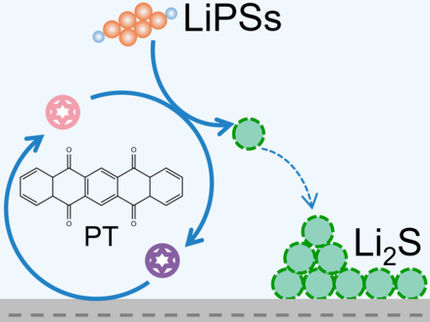Waterloo chemist one step closer to a new generation of electric car battery
An ultra-thin nanomaterial is at the heart of a major breakthrough by Waterloo scientists who are in a global race to invent a cheaper, lighter and more powerful rechargeable battery for electric vehicles. Chemistry Professor Linda Nazar and her research team in the Faculty of Science at the University of Waterloo have announced a breakthrough in lithium-sulphur battery technology in Nature Communications.
Their discovery of a material that maintains a rechargable sulphur cathode helps to overcome a primary hurdle to building a lithium-sulphur (Li-S) battery. Such a battery can theoretically power an electric car three times further than current lithium-ion batteries for the same weight - at much lower cost.
"This is a major step forward and brings the lithim-sulphur battery one step closer to reality," said Nazar, who also holds the Canada Research Chair in Solid State Energy Materials and was named a Highly Cited Researcher by Thomson Reuters.
In theory, sulphur can provide a competitive cathode material to lithium cobalt oxide in current lithium-ion cells. Sulphur as a battery material is extremely abundant, relatively light, and very cheap.
Unfortunately, the sulphur cathode exhausts itself after only a few cycles because the sulphur dissolves into the electrolyte solution as it's reduced by incoming electrons to form polysulphides.
Nazar's group originally thought that porous carbons or graphenes could stabilize the polysulphides by physically trapping them. But in an unexpected twist, they discovered metal oxides could be the key. Their initial work on a metallic titanium oxide was published earlier in August in Nature Communications.
While the researchers found since then that nanosheets of manganese dioxide (MnO2) work even better than titanium oxides, their main goal in this paper was to clarify the mechanism at work.
"You have to focus on the a fundamental understanding of the phenomenon before you can develop new, advanced materials," said Nazar.
They found that the oxygenated surface of the ultrathin MnO2 nanosheet chemically recycles the sulphides in a two-step process involving a surface-bound intermediate, polythiosulfate. The result is a high-performance cathode that can recharge more than 2000 cycles.
The surface reaction is similar to the chemical process behind Wackenroder's Solution discovered in 1845 during a golden age of German sulfur chemistry.
"Very few researchers study or even teach sulphur chemistry anymore," said Nazar. "It's ironic we had to look so far back in the literature to understand something that may so radically change our future."
Other news from the department science
Most read news
More news from our other portals
See the theme worlds for related content
Topic World Battery Technology
The topic world Battery Technology combines relevant knowledge in a unique way. Here you will find everything about suppliers and their products, webinars, white papers, catalogs and brochures.

Topic World Battery Technology
The topic world Battery Technology combines relevant knowledge in a unique way. Here you will find everything about suppliers and their products, webinars, white papers, catalogs and brochures.





























































